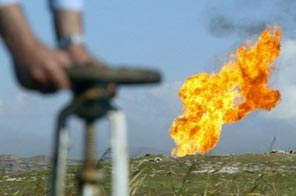Iraq strikes deal with Lukoil over massive oilfield
BAGHDAD: Iraq struck a deal with Russian energy giant Lukoil on Saturday to develop one of the world's biggest untapped oilfields as part of efforts by Baghdad to dramatically ramp up its crude output.
The agreement over the West Qurna-2 reservoir with Lukoil, which will share the project with Norwegian firm StatoilHydro, comes a day consortiums led by Shell and CNPC were awarded contracts.
The deals reached so far in the two-day auction promise to increase Iraq's oil production by more than 4.2 million barrels per day (bpd) in the coming years as the country seeks to become one of the world's biggest energy producers and bring in much-needed revenue to rebuild its war-battered economy.
"We can announce that Lukoil has won the contract to develop the West Qurna-2 oilfield," Oil Minister Hussein al-Shahristani said at the oil ministry conference hall where the auction was being held.
Lukoil and StatoilHydro requested 1.15 dollars for each barrel extracted from the giant field and projected output of 1.8 million barrels per day (bpd). Lukoil will take 85 percent and StatoilHydro 15 percent.
West Qurna-2 is one of the world's biggest undeveloped oil fields, with known reserves of 12.9 billion barrels. It lies west of the equally enormous Majnoon field, which was auctioned on Friday to Anglo-Dutch firm Shell and Malaysia's Petronas.
Shell and Petronas will receive 1.39 dollars per barrel of oil they extract from Majnoon, which has proven reserves of 12.6 billion barrels, and project that they will produce 1.8 million bpd.
China's CNPC, meanwhile, led a group comprising Petronas and France's Total on Friday to capture Halfaya, also in southern Iraq.
The trio requested 1.40 dollars per barrel and projected production of 535,000 bpd. The field has known reserves of 4.1 billion barrels.
No bids were received, however, to work on either the East Baghdad field, or the cluster of fields referred to jointly as Eastern Fields. Related article: List of Iraq's deals with foreign oil firms.
Analysts said companies were concerned by still-common violence in the areas close to Baghdad and in Diyala province where the fields are situated.
Saturday morning, Angolan firm Sonangol said it reached agreement with Baghdad over the Qaiyarah field after the company reduced its initial offer. A day earlier, Iraq had rejected Sonangol's per-barrel bid as too high.
Iraq relies massively on oil sales for its economic growth and government income. It will be hoping the auction, the second since June, generates positive headlines ahead of a parliamentary election scheduled for March 7.
The country wants to boost oil production to seven million bpd within six years from 2.5 million now. In the longer term, it is targeting 10 to 12 million bpd, making it a potential rival of Saudi Arabia.
Successful companies will be paid a fixed fee per barrel, not a share of the profits, and only after an agreed production threshold has been reached.
A tight security perimeter was thrown up around the oil ministry for the auction, with some attendees having to abandon their cars around two kilometres (1.25 miles) away and walk the remaining distance.
All participants were subjected to multiple checks before being allowed to enter.
The auction comes just days after coordinated bombings struck Baghdad on Tuesday, mostly targeting government ministries, the third such attack since August.
Bombers have also repeatedly hit Iraq's oil infrastructure, most recently sabotaging the main export pipeline from northern Iraq to the Turkish Mediterranean port of Ceyhan in November.
In the first bid round in June, only one deal was reached because of the perceived low return on investment being offered by the Iraqi government, although two other foreign consortiums have since signed deals with Baghdad.
At 115 billion barrels, Iraq has the world's third-largest proven oil reserves, behind only Saudi Arabia and Iran. Oil sales provide 85 percent of government revenues.






